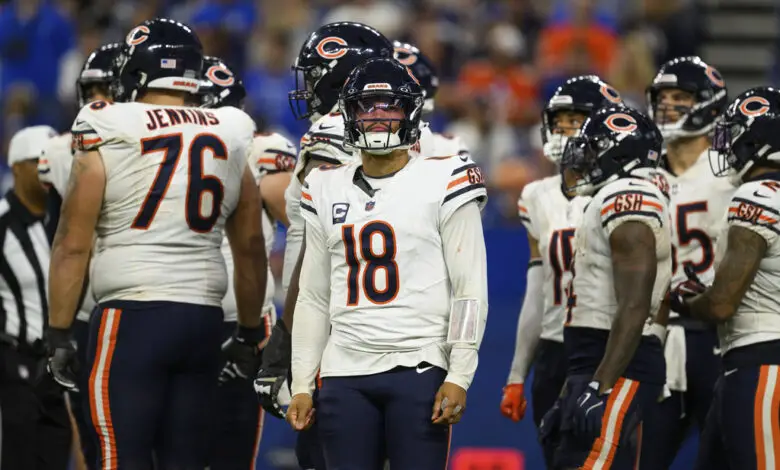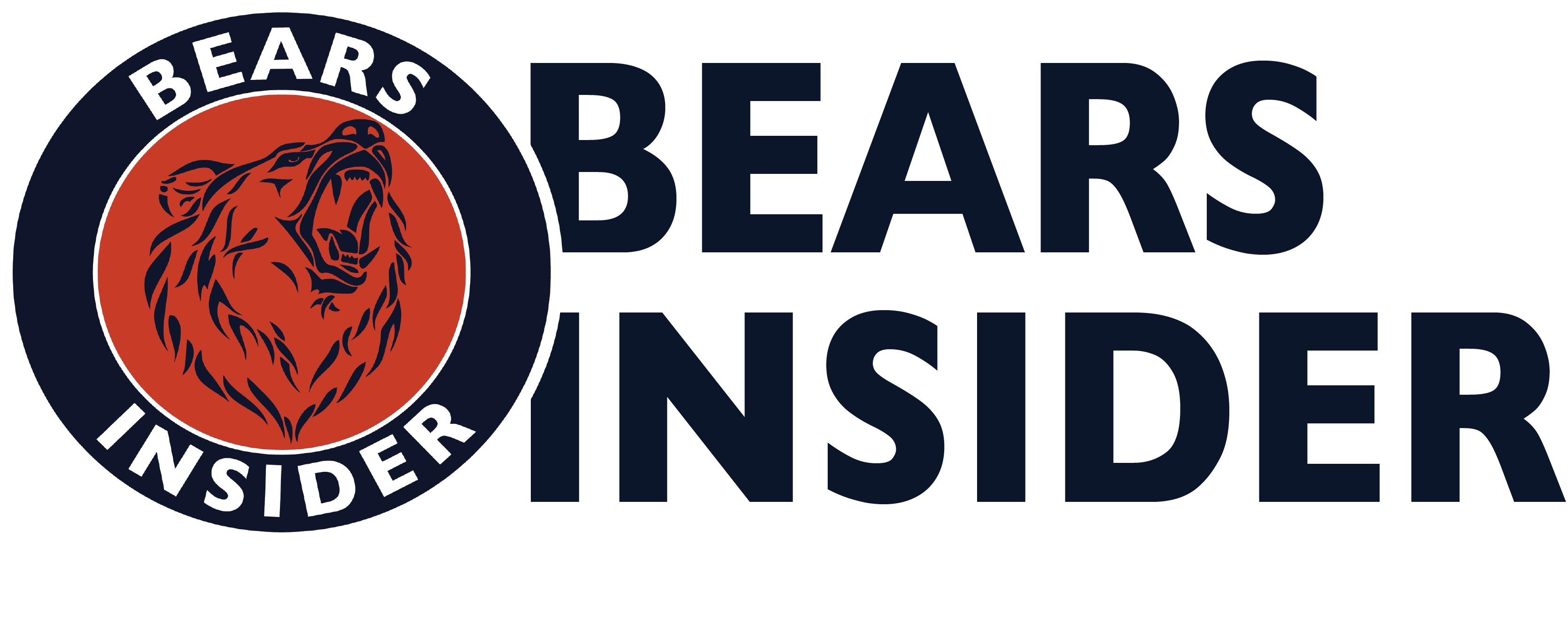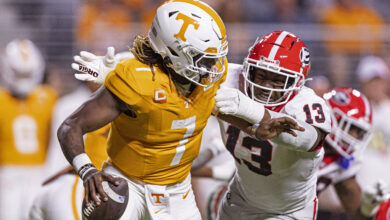
Bears’ Offense an Exercise in Exasperation
The Bears on Sunday ran a short-side option play on 4th-and-one at the goal line and lost 12 yards. That is a microcosm of Chicago’s offense through three games. If you thought things were bad with Luke Getsy in charge, they might be worse with Shane Waldron calling these types of plays. Caleb Williams committed too late, the line was a sieve, and D’Andre Swift was immediately surrounded by half of the Colts’ defense. It almost looks like Indianapolis knew the play in advance.
The Bears lost 12 yards on 4th-and-goal from the 1-yard line.
(Via @NFLonCBS) pic.twitter.com/kEZ635JAUE
— Marquee Bears (@BearsMarquee) September 22, 2024
It looks to me like Chicago’s offensive linemen blocked the wrong way. The call might have succeeded, in fact, had the Bears pushed those defenders away from the play. Williams was surrounded by three unblocked linemen and a linebacker before two full seconds had elapsed. Swift was looking at a wall of six defenders a second and a half later. It was a bad call regardless, but it’s amplified when the entire line misses its assignments, and that’s poor coaching.
The Bears should have kicked a field goal, but I’ll get to head coach Matt Eberflus in my next column. I know the coaching staff wanted to remove the goose egg from Williams’s touchdown ledger, but Eberflus should have chosen the nearly guaranteed chip shot by Cairo Santos. The Bears left three points off the board that might have changed the way the 4th quarter played out in Sunday’s 21-16 loss.
Cole Kmet talked about missed assignments and a failure to adjust after the Week 2 loss to the Texans.
“I know everyone just wants to look at the offensive line,” Kmet said. “You see a sack and maybe you feel like it’s on the offensive line. But there’s a lot of things that go into it, whether it’s receivers having to run the right routes, and if they’re not there that causes the quarterback to hold the ball a little bit more, leading to sacks. There are also protection adjustments. You see pressure and have to adjust off the pressure you see and maybe make a slide different here and there and get the linemen to the right spots. Or it’s a miscommunication up front as to what play we’re running.
“There’s a lot that goes into it. I don’t think it’s necessarily a talent issue upfront. I don’t think we were getting overmatched totally [and] physically up front. But I think us getting on the same page can lead to those adjustments, and [then] we can see those sacks come down a little bit.”
Chicago’s running game is struggling badly, and that play by Swift just makes no sense.
Waldron struck again and did Williams no favors when he asked Cole Kmet to block Laiatu Latu with the Bears down by one score midway through the 4th quarter. The resulting strip sack led to an Indianapolis touchdown that put the game out of reach. Kmet will be the first to raise his hand and say he should have made that block, but he shouldn’t have been put in that position unless the Bears kept Swift in the backfield as a secondary blocker.
End zone cutup of Laiatu Latu's (97) arrival.
Latu provided a team-high 7 pressures on 28 rushes (25% pressure rate) to go with his first strip-sack in the NFL. #Colts pic.twitter.com/s2f07empt6
— Noah Compton (@nerlens_) September 23, 2024
Five of Latu’s pressures came on 19 one-on-one matchups against Bears LT Braxton Jones (26.3%).
Williams had his best game as a pro if you’re looking for a silver lining. The rookie quarterback completed 33 of 52 pass attempts for 363 yards. He had two touchdown passes, but he also threw two interceptions. Williams is often off-target when throwing deep ball, but he’ll find his touch.
Kmet had a good game too, something Waldron promised during the last week of practices. He caught 10 passes for 97 yards and a score and finally found some chemistry with his quarterback. That kind of production is necessary because the Bears can’t run the ball. Swift finished with 20 yards on 13 carries, a sorry average of 1.5 YPC. The free-agent acquisition has 68 yards through three games on 37 carries. I’ll let you do the math, but it gets worse. The Colts allowed the most rushing yards (474) through their first two games but only 63 rushing yards on 28 carries Sunday against the Bears. Chicago had four negative rushes that totaled 20 yards in losses.
Rome Odunze gave Bears fans something to cheer about, too. His strength, speed, and ability to make contested catches were on display all game. He and Williams hooked up for a 4th quarter touchdown pass, NFL firsts for both players. The two rookies are going to be fun to watch the rest of this season. Williams has accounted for nearly 90% of Chicago’s offensive output, and his 363 yards passing was the most ever by a Bears rookie, and 11th-best among all quarterbacks in franchise history.
motion. under center. play action. extra protection with 84 + 11.
Caleb Williams could split this to DJ Moore, but he takes the 1 on 1 down the sideline to Odunze off motion
this is beautiful ? pic.twitter.com/5gby1UHRpS
— Josh Norris (@JoshNorris) September 23, 2024
In an effort to be more positive, I’ll point out some of Sunday’s highlights, most belonging to Williams.
- For those who say Williams can’t read defenses, he had little trouble identifying coverages on Sunday. That was most apparent when he connected with Kmet. Williams wound up several times before Kmet finished his route, hitting the tight end just as his head turned, often splitting the zone between the linebacker and cornerback.
- He was 19-of-22 on quick passes where he read and beat the defense for 115 yards and a touchdown.
- Williams was 14-of-18 in a blistering 4th quarter marred only by Latu’s sack and strip.
- The rookie quarterback shows an innate ability to quickly find the best option. Most first-year quarterbacks struggle with progressions, but Williams quickly identifies multiple opportunities. He’s going to be very good once he becomes more accurate with his deep ball.
- Williams was 29-of-43 for 331 yards with a clean pocket on Sunday with 15 first downs and one score. His release time averaged 2.31 seconds on those plays, but he’s still learning on the job and the turnovers were killers. Williams also overthrew Odunze twice by about 30 combined yards. You can’t deny that he is getting better with each start, though those off-target tosses are concerning.
- Kmet was three yards shy of giving Chicago two pass catchers with 100+ receiving yards. Odunze had 112 yards on six receptions, and D.J. Moore added 78 yards on eight catches. The Williams-Moore pairing is still a work in progress, but he and Justin Fields didn’t find their chemistry last season until a Week 5 blowout win against the Commanders in Washington.
- Chicago played playoff-caliber defense for the third straight week, though the front seven failed to contain running back Jonathan Taylor. Chicago intercepted Anthony Richardson twice and kept the Bears in the game until late in the 4th quarter.
Niceties aside, the Bears are 1-2, have a one-dimensional offense that needs a lot of fine-tuning, and have made far too many poor decisions, coaches and players alike. The offensive line is a wreck, and it’s clear that Waldron’s playcalling is suspect or his plays aren’t being communicated properly. An entire offensive line simultaneously missing its assignment offers no chance for acquittal. There’s work to be done, but the team is by no means a lost cause. It’s just going to take a little longer than everybody had hoped for, Williams included.

